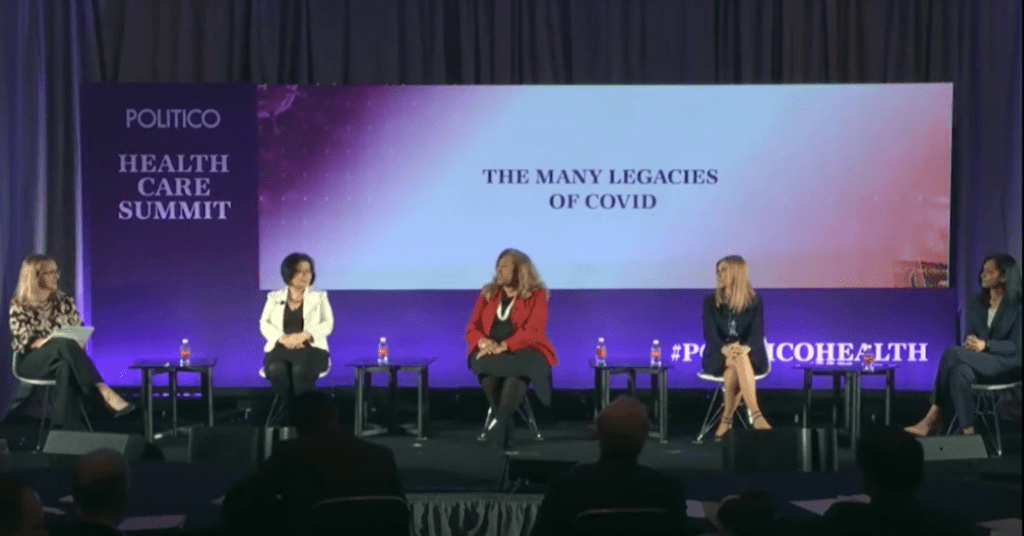The pandemic showed us that we can develop vaccines and other drugs in a short time, and get a lot of people vaccinated, but also that we have to be able to do more, said Phyllis Arthur of the Biotechnology Innovation Organization (BIO). She and other experts discussed legacies and lessons from COVID-19 during POLITICO’s inaugural health care summit yesterday.
The event brought together health care providers, policymakers, federal regulators, patient representatives, and industry leaders to explore the policies, politics, and tech trends shaping health care as the United States moves into the third year of the pandemic.
The summit kicked off with a conversation about The Many Legacies of COVID, where Phyllis Arthur, Vice President of Infectious Disease and Emerging Science Policy at BIO, joined an all-female panel of experts that included Deputy Secretary of Maryland Public Health Services Dr. Jinlene Chan, Johns Hopkins Hospital President Dr. Redonda Miller, and Humana SVP Dr. Mona Siddiqui. The panel was moderated by POLITICO health care reporter Krista Mahr.
The legacies of COVID-19
“I think that obviously everyone would say mRNA is a game changer,” said Arthur.
“I also think that we’ve made huge strides in some of the other platform technologies such as monoclonal antibodies,” she continued. “They’re scalable, they’re flexible and the manufacturing for them can be done in ways that can surge when it needs to. They can also be pivoted quickly if we see variant changes.
“The combination of these powerful biologics actually could allow us to be much quicker in response and coupled with better surveillance, could maybe even help us not have a pandemic.”
How can we improve health messaging?
While Americans were eager for early doses of the COVID-19 vaccine, the interest in boosters waned later in the pandemic.
“There were a whole lot of people standing in line for the first set of COVID vaccines,” she said. “Then we hit that plateau of the people who were trying to understand the data. Did they see themselves in the data? Why was the development of this vaccine so fast? If vaccine development was not fast before, how can I trust it?”
“What really drove communities to get vaccinated was actually activation by authorities at the community level,” she continued. “The CDC, industry, and others all really tried to support what were respected and trusted messengers as close to the patients as you could get.”
BIO seeks to combat vaccine hesitancy with information, including through our COVID Vaccine Facts site and through other publications.
‘We have never vaccinated the entire adult population in America before’
Ultimately, in Arthur’s view, the legacy of the COVID-19 pandemic can be seen in the rapid and impressive development of vaccines as a result of holistic, cooperative investment, and innovation on the part of governments, business, and communities.
This development must, however, be coupled with a better understanding that to reach communities and promote public health, you have to dig into those communities and invest in their leadership and points of view.
“We have never vaccinated the entire adult population in America before,” Arthur pointed out.
“How can we leverage that into a new rate and a new plateau higher for flu and shingles and pneumococcal and all the things that individuals actually need for their own wellness?” she asked. “We need to make it about your wellness and your health security personally.”




